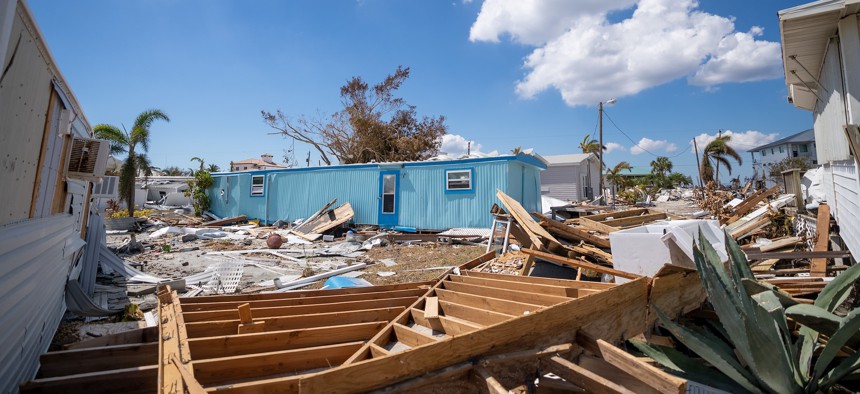Pushing Ahead Projects to Protect Against Climate-related Disasters

Photo taken on Oct. 4, 2022 shows the aftermath of Hurricane Ian in Fort Myers, Florida, the United States. Rolando López/Xinhua via Getty Images

Connecting state and local government leaders
Projects to deal with risks like flooding and hurricanes are being buoyed by new federal funding. But state and local officials say it can sometimes be a heavy lift to access the money.
From a giant drainage tunnel in Charleston, South Carolina, to a $2 billion coastal restoration plan in Louisiana, state and local governments are finding ways to adapt to threats like flooding and severe storms, and many are turning to a wave of new federal funding to help them do it.
But while the added dollars available under the major infrastructure and climate packages Congress approved during the past two years offer welcome support, state and local officials say that tapping the money can prove difficult given obstacles like complex application processes and the need for local matching funds. This can be especially true for smaller communities and places recovering from disasters.
“I think it needs to be easier for us to build the case for resilience projects locally, to secure funding for them and then to implement those projects without the overwhelming burden of the administrative process of that funding,” Anne Coglianese, chief resilience officer of Jacksonville, Florida, said during a Pew Charitable Trusts panel on Thursday.
Coglianese pointed out, for instance, that processes for federal cost-benefit analyses differ across agencies, and that they don’t always capture the nuances of a proposed project, such as the full benefits of new technology or how it might advance equity initiatives.
“Having these large pots of funding is so valuable, but it's also how that's deployed and how we can use it that really will ultimately determine the resilience of communities,” she added.
Louisiana Chief Resilience Officer Charles Sutcliffe noted that with so much new federal funding now available, it can be hard to determine which agency communities need to work with to access the money. That process can be especially difficult for disaster victims, and federal agencies need to move faster to meet their needs, he added.
“People are making decisions as soon as it's dry enough to get back to their house and then some of those decisions are huge financial commitments for them,” he said.
For smaller and less well-off communities, coming up with matching funds to qualify for grants can be prohibitive, said Tamara Sluss, chief resilience officer of Louisville, Kentucky. She called for those requirements to be dropped from some grant programs or reduced to lower rates.
“I think that would open up a lot more funding for communities,” she said.
Crafting Adaptation Plans
The panelists also lauded the federal government for its recent movement on the resilience front, particularly for climate adaptation plans federal agencies were required to create last year. On Thursday, “report cards” for those plans were released, detailing the progress agencies have made toward their goals.
The plans have provided a template for states to follow. Sutcliffe said 12 Louisiana agencies are currently working on similar adaptation plans.
“These federal guides did provide a way in for some of our state agencies who haven't always been a part of the adaptation conversation at all,” he said.
Taking that guidance a step further to provide formal coaching or mentoring for state or municipal agencies looking to develop their adaptation plans could be helpful, he added.
South Carolina Chief Resilience Officer Ben Duncan said that ensuring states and municipalities have the data they need to drive their planning is also critical.
The National Oceanic and Atmospheric Administration and the U.S. Department of Housing and Urban Development are two agencies that have provided data to help the state develop its resilience plan, but data from more federal partners would be helpful, Duncan said.
Projects Underway
The panelists noted that in addition to working with federal agencies, community organizations and nonprofits have helped some major projects come to fruition.
Under its climate adaptation plan, Louisville is working with various agencies and organizations in the metropolitan area to shift the community to 100% renewable energy by 2040. The city also has a smart city plan that focuses on mobility, with the aim of reducing residents’ dependence on cars and improving air quality.
Jacksonville is working on a web-based data tool that will provide insight into what hazards communities are likely to be exposed to and the social vulnerabilities that can exacerbate those risks. The city is also developing a resilience strategy that Coglianese said she expects to be released next summer.
In Charleston, a low-lying coastal city where flooding is an issue—“If you sneeze hard, it will flood in Charleston,” as Duncan put it—the city is building a tunnel that will drain 335,000 gallons of stormwater per minute, according to Duncan. The drainage system will hold that water until the tide rolls out, then release it into the Ashley River.
And after decades of studies and discussion, Louisiana plans to begin an ecosystem restoration project along its coast next year in what Sutcliffe described as one of the largest such efforts in the nation. The project, which has been shaped by area nonprofits, would divert water and sediment from the Mississippi River to reestablish wetlands and make improve existing ones.
Molly Bolan is an assistant for Route Fifty.

NEXT STORY: How the Supreme Court Could End Up Blocking a Key Path to Sue States



